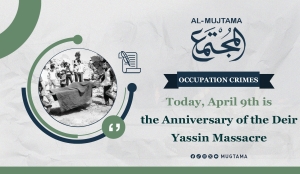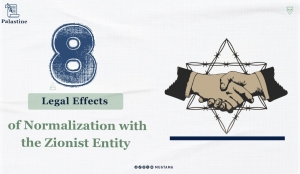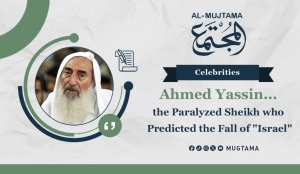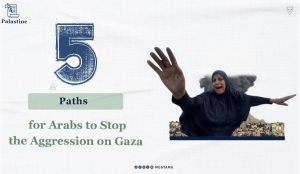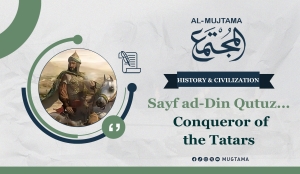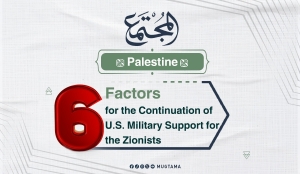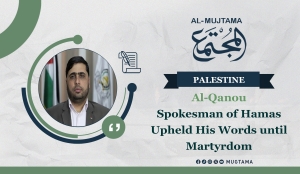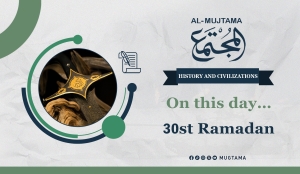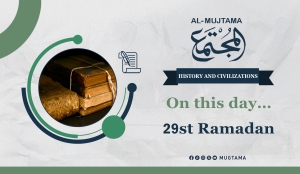Nada Gamal
Suhayb al-Rumi... 'The deal is profitable, Abu Yahya.
April 09, 2025In Islam, no one has superiority over another except by piety and good deeds. There is no poor person whom people disdain, nor a stranger who is shunned by others, nor a foreigner who is pushed away from positions of responsibility simply because he is not an Arab. Everyone in this nascent society is equal; everyone here is one; everyone here is brothers, connected by a bond that is much stronger than the bond of brotherhood by blood.
The Islamic community consists of individuals who are not strangers to one another. Here is Abu Bakr al-Siddiq, the free merchant, and Umar ibn al-Khattab, the strong and mighty, and Bilal ibn Rabah, the Ethiopian slave, and Salman the Persian, who struggles with the letters of the Arabic language, and Suhayb the Roman, who has a Western accent in his speech. They are all loving brothers, complementing each other, so none of the younger ones feel inadequate, nor do the strangers feel alienated, and none of the wealthy feel pride except for the honor of being blessed with Islam. This is how Suhayb was, who came from afar, leaving behind his father's dignity, seeking the honor and brotherhood of Islam far away in the lands of the Arabs.
He is Suhayb ibn Sinan (Abu Yahya al-Namri), from the Namir tribe of Qasit. He is known as al-Rumi because he lived in Rome for a while. He is originally from the island region and was captured from the village of Nineveh, which is in the vicinity of Mosul. His father or uncle was a governor for Khosrow. He was taken captive by the Romans when they raided his town, and then he was brought to Mecca, where he was bought by Abdullah ibn Judan at-Taymi.(1) Born in the lap of luxury and opulence, he was then taken as a slave to the lands of the Romans, where he spent his youth among them to learn from them and acquire their language. Eventually, he was captured by slave traders, and he ended up in Mecca, where he was purchased by Abdullah ibn Judan, who admired him for his enthusiasm. Abdullah freed him and allowed him to work in trade and earn a livelihood through it.
Islam Suhayb:
God Almighty permits man to receive goodness, and there is no one to reject what God desires. The light descends to illuminate the heart’s path, so that the limbs obey and gently follow the heart. The value of companionship that a person chooses in this world becomes apparent, driven by pure intent, without any mention of mutual interests or anticipated goals.
And Allah allowed Suhayb to let understanding invade his heart and mind, leading him toward Dar al-Arqam after he heard about the new religion. His sound nature, enlightened heart, and aware mind guided him. And because he chose Ammar bin Yasir as a friend and companion, their steps were aligned toward the same goal, at the same time, carrying the same desire towards Allah, the Almighty.
And here is Ammar recounting their story of embracing Islam together: I met Suhayb at the door of the house of Al-Arqam, where the Messenger of Allah (peace be upon him) was. We entered, and he presented Islam to us; so, we embraced Islam. Then we stayed like that for a day until evening came, and we went out while being discreet.(2)
Suhayb begins another life with his companion, and indeed with his brothers, leaving behind the world in pursuit of God's pleasure, so that it chases them and lays its glory before them. The sacrifices they made were not in vain; they are the poor, the slaves, the followers, and the weak. They are the ones facing disbelief without a tribe to support them, without family to shelter them, and without a refuge to hide them from the eyes of the polytheists who subjected them to torture day and night.
The Migration of Suhayb and His Struggle.
Many times, a person finds themselves at important stations in their life, questioning the secret behind all that is happening around them in the universe, life, and fate. What lies behind all this beauty, wisdom, and precision in the management of the universe? What does age mean? What is the value of money and status? What is the worth of power and governance?
When you find answers to those questions, all sacrifices become trivial, and a single lifetime is no longer enough for a person to devote to what they believe in regarding the God of the one and only universe, the Unique and Eternal, the Just Judge. What is the value of having the world granted to you by God if you are not on His path?
The believers immigrated, and then the Prophet Muhammad (peace be upon him) migrated to Medina, and Islam became a complete state. In Mecca, Suhayb remained managing his business and wealth, but his spirit longed for good companionship and for establishing the religion of God among the believers. Suhayb had no protection to shield him when he left, so the price of his departure for his faith was everything he owned, including his wealth and home. He had to negotiate with Quraysh, not out of a desire for money, but out of a desire to escape with his faith, no matter the cost. For one who has purchased Paradise, selling the world and all that is in it becomes easy. Without hesitation, Suhayb relinquished all that he had earned in his previous years to join the Prophet (peace be upon him) and his companions.
When Quraysh detained him while he was migrating, he said to them after dismounting from the camel, and scattering what was in his quiver and taking his bow: "O gathering of Quraysh, you know well that I am one of the best archers among you. I swear by Allah that you will not reach me until I have thrown what is in my quiver, then I will strike with my sword whatever remains in my hand of it, then do what you will. If you wish, I will guide you to my wealth and leave you, my way?" They said: "We will do it." Then he said to them: "I bear witness before Allah that I have left all my wealth for you, and my wealth is in such and such place.(3)
The news of Suhayb reached the Prophet, peace be upon him, after he had joined him in Medina. The Prophet, peace be upon him, said to him: Your transaction has been fruitful, O Abu Yahya. Your transaction has been fruitful. And recited the word of Allah, the Exalted.( And there are those who would dedicate their lives to Allah’s pleasure. And Allah is Ever Gracious to ˹His˺ servants.) (Al-Baqarah:207)
Suhayb witnessed all the events with the Prophet Muhammad (peace be upon him) in every battle and every expedition, but his greatest struggle was in his migration and his resistance to the instinct of love for wealth. He willingly gave up everything he owned as a redemption for his migration and in pursuit of his beloved ones. As for his presence in the events, Al-Tabarani reported that he said: 'The Messenger of Allah (peace be upon him) did not attend a single event except that I was present; he did not give an oath of allegiance except that I was there; and he did not send out an expedition except that I was present; nor did he engage in a battle except that I was on his right or his left. Whenever they feared an enemy in front of them, I was in front of them, and whenever they feared behind them, I was behind them. I never placed the Messenger of Allah (peace be upon him) between me and the enemy until the Prophet (peace be upon him) passed away.
________________________________________
- Sir A'lam al-Nubala, Vol. 2, p. 18, by Imam Shams al-Din al-Dhahabi.
(2) The previous reference, Vol. 2, p. 17.
(3) Ibn Hajar al-Asqalani, Al-Isabah fi Tamyiz al-Sahabah: (3/365), and Ibn Abd al-Barr, Al-Isti'ab fi Ma'rifat al-Ashab: (2/729), and al-Dhahabi, Sir A'lam al-Nubala: (3/353)
On the anniversary of the Deir Yassin massacre, how the Zionist gangs used terror to displace Palestinians.
April 09, 2025The history and criminal record of the Zionist entity is filled with massacres against the innocent, and the bloodshed in Gaza continues to flow, due to their violation of the covenant, just like their ancestors. Allah, the Exalted, said.( They were condemned˺ for breaking their covenant, rejecting Allah’s signs, killing the prophets unjustly, and for saying, “Our hearts are unreceptive!”1—it is Allah Who has sealed their hearts for their disbelief, so they do not believe except for a few—( (An-Nisa:155)
The massacres that occurred in Gaza are countless, but was the beginning the Al-Aqsa flood ? Has Israel always been a proponent of peace and was only moved by the events of October 7? If it claims to be a proponent of peace, as it falsely asserts, can one day's events lead to killing, destruction, and devastation for two years?
The massacres that are being committed in Gaza daily in front of the world's eyes and its shameful silence are merely the result of a long history filled with horrific Zionist massacres against the people of Palestine.
In the midst of the fiery events currently unfolding in the Gaza Strip, and the displacement of many of its residents due to the brutal attacks, the blockade, the prevention of aid entry, and the use of vile tactics to forcibly relocate the people of the Strip, we are reminded of the anniversary of the forced displacement and the horrific massacre that took place in Deir Yassin.
The Zionist massacres are only meant to nourish the spirit of hatred, malice, and a love for bloodshed among the Zionists. We cannot forget the statement made by the Zionist Minister of Heritage, Amihai Eliyahu, regarding dropping a nuclear bomb on Gaza and wiping it out completely. This was not the first of such statements; the former Israeli Minister of Defense, Yoav Gallant, described the people of Gaza as human animals that must be eradicated.
The massacres have not occurred against armed individuals or fighters, but have always taken place against civilians, women, and children, as well as against civil defense crews and paramedics. Each time the Zionist occupation denies the bombing and killing of civilians, its lies and fabrications are exposed. Recently, we witnessed the tragic assassination of 15 relief workers in Rafah. A video surfaced showing one of the paramedics debunking the lies of the Zionist occupation. The video clearly displayed signs indicating that they were ambulances and relief vehicles, but the treacherous hands of the Zionists had another opinion.
Israel ... A history full of massacres:
Since the establishment of the Zionist entity, Zionist gangs have committed, over a span of 86 years, massacres, and atrocities against many unarmed civilians. The Deir Yassin massacre is not the first nor the last in the dark history of the Zionist entity. There was also the massacre of the village of Abu Shusha in 1948, which is located near Deir Yassin. It began at dawn and approximately 50 women, children, and elderly people were martyred, as gunfire was opened on everything that moved. The Tantura massacre occurred in the same year in an ancient village with a history dating back to before Christ. The Haganah gang entered the village in 1948 with the aim of expelling the residents, and by early morning, the entire village had fallen into the hands of the Zionist gangs. The massacre left more than 90 martyrs, who were buried in a mass grave that is now used as a parking lot. Israeli massacres did not stop there; in 1956, the Israeli occupation army carried out a massacre against Palestinian refugees in Khan Younis camp in southern Gaza, resulting in the deaths of more than 250 Palestinians, known as the Khan Younis massacre. We cannot forget the Ibrahimi Mosque massacre in 1994, which claimed the lives of 29 worshippers. It was carried out by a settler named Baruch Goldstein, of American origin, who stood behind one of the mosque's pillars waiting for prayer to begin. When the worshippers prostrated, he opened fire with his machine gun on them, and during the massacre, the occupation soldiers closed the mosque's door.
Deir Yassin Massacre.
The village of Deir Yassin is located on the slope of a hill that rises to a height of 800 meters above sea level, and it is about 5 kilometers west of Jerusalem. On April 9th, armed gangs from the Haganah and Irgun entered the city, resulting in the deaths of more than 360 people. This is according to the confession of Menachem Begin, the former Prime Minister of the Zionist entity. Strangely, he is a man of peace and a Nobel Prize laureate who took pride in this massacre in his book, "The Revolt... The Story of Irgun.
The village of Deir Yassin witnessed the brutality of the Zionist gangs when they took its residents by surprise. The Zionist gangs entered the village at dawn, and the members of the Israeli gangs began to kill anyone who fell into the range of their weapons. Afterward, they started throwing bombs inside the village houses to destroy them along with the people inside, as their orders were to destroy all the houses in the Arab village. At the same time, members of the Irgun and Stern gangs followed the bombers and killed anyone who remained alive inside the destroyed homes. The massacre continued until the afternoon hours, and among those who participated in this massacre were Menachem Begin, the founder of the Irgun gang, as well as the leader of the Stern gang, Yitzhak Shamir, who was a former prime minister and a former leader of the Likud party.
Menachem Begin said in his memoirs about the massacre: "The Arabs defended their homes, women, and children fiercely... This operation had significant and unexpected results; the Arabs were struck with a strong panic after hearing the news of Deir Yassin, and they began to flee in terror... shouting Deir Yassin...!! Of the 800,000 Arabs who lived in the land of Israel - occupied Palestine in 1948 – only 165,000 remained." Begin then criticized those Jewish leaders who distanced themselves from it, accusing them of hypocrisy by saying: "The Deir Yassin massacre led to decisive victories on the battlefield... The State of Israel would not have been established without the victory at Deir Yassin.
In the year following the massacre, the Zionists celebrated with the presence of ministers and rabbis on the land of the village, and the city of Givat Shaul was built on the ruins of the village of Deir Yassin.
8 Legal Effects of Normalization with the Zionist Entity
April 07, 2025The world has recently witnessed drastic changes in international relations, especially in the Middle East, where normalization with the Zionist entity has become one of the most controversial issues.
The normalization leads to a number of legal effects that impact local and international positions, including legal obligations, legislative amendments, and relationships with the Palestinian issue and the rights of refugees.
Here are the main effects:
- International legal obligations
Normalization involves ratifying the diplomatic peace agreements signed with the occupation, such as the Camp David or Oslo Accords, which imposes an obligation on the normalizing state to implement the provisions contained in those agreements. It also entails formal recognition of "Israel" as a sovereign state, thereby enhancing its status in the international community.
- Amendments to local legislation
Normalization may require amending national legislation, including lifting restrictions on trade and travel with the occupying entity. These amendments also encompass updating laws related to economic, cultural, and military relations between normalizing countries and "Israel.
- The change in the stance on the Palestinian issue
Normalization with the occupation may lead to a shift in legal positions regarding the Palestinian cause, particularly concerning the rights of Palestinians. This could be seen as a departure from traditional stances that supported Palestinian rights in the face of occupation.
- Commitment to international law
Normalization raises questions about the commitment of normalizing countries to international law, particularly concerning the Palestinian issue and human rights in the occupied territories. This may be seen as support for Israeli occupation policies.
- Legitimizing the occupation
Normalization with the occupation may contribute to granting legal legitimacy to the ongoing "Israeli" settlement in the occupied Palestinian territories, which is in contradiction with United Nations resolutions that condemn these policies.
- Damaging relationships with countries opposed to normalization.
Countries that normalize their relations with the Zionist entity may face tension in their legal relations with Arab and Islamic countries that reject normalization. This could lead to political and diplomatic complications in the regional landscape.
- International pressures
The states that normalize relations may face pressure from countries and human rights organizations opposing normalization, especially if it is seen as contributing to the continuation of the Israeli occupation policy against the Palestinians.
- Rights of Palestinian Refugees
Normalization may negatively affect the position of the normalizing country regarding the rights of Palestinian refugees, particularly concerning the right of return, which is rejected by "Israel." This impact may also be reflected in national legislation related to the rights of Palestinian refugees.
Read also : Normalization with Israel: Concept and Agreements
Introduction
No one could have imagined that the elderly Sheikh, who was assassinated by Israeli occupation aircraft nearly 21 years ago, would leave behind a generation that would instill fear in the ranks of the enemy and spread terror among its settlers and soldiers.
Birth and Upbringing
The spiritual father of the "Hamas" movement, which carried out "The Al-Aqsa Flood," was born on June 28, 1936, and was martyred in March 2004. However, his memory remains alive in the hearts of every Palestinian, as they watch the "Izz ad-Din al-Qassam" fighters inflict heavy losses on the enemy, standing firm against the brutal "Israeli," American, and Western machine, with nothing but God Almighty on their side.
Ahmed Ismail Yassin grew up in a historical village called Joura Ashkelon in 1936. He lost his father when he was only 5 years old and witnessed the Nakba of 1948 when he was 12; this left a profound impact on him, instilling the necessity of resistance and engaging in the liberation struggle, as well as the determination not to concede an inch of Palestinian land to the Zionist enemy.
The incident that affected his life.
In 1952, at the age of sixteen, he suffered a serious accident that permanently affected his life, as he sustained a fracture in his neck vertebrae while playing with some friends, leading him to spend the rest of his life confined to paralysis.
He completed his secondary education during the academic year 1957-1958, and later worked in the professions of teaching and preaching. He became one of the most prominent advocates in Gaza, married one of his relatives, and she gave birth to 3 sons and 8 daughters.
The formation of the Islamic Resistance Movement, Hamas.
The late individual embraced the ideology of the Muslim Brotherhood, which was founded in Egypt in 1928. He was active in resisting occupation and gathered donations to help the families of martyrs and detainees. He later assumed the presidency of the Islamic Community in Gaza.
As a result, he was arrested in 1982 and sentenced to 13 years in prison, but he was released again in 1985 as part of a prisoner exchange deal between the Israeli occupation authorities and the Popular Front for the Liberation of Palestine.
In 1987, he agreed with a group of leaders of Islamic work in the Gaza Strip, who belonged to the Muslim Brotherhood movement, to establish an organization aimed at resisting the Israeli occupation and liberating Palestine, which they named the "Islamic Resistance Movement," known as "Hamas.
He was re-arrested on May 18, 1989, along with others from the ranks of "Hamas," and received a 15-year prison sentence on charges of inciting the abduction and killing of "Israeli" soldiers, as well as founding the "Hamas" movement and its military and security apparatuses.
On October 1, 1997, Sheikh Yassin was released after a failed attempt to assassinate Khaled Mashal, the head of the political bureau of "Hamas," in the Jordanian capital, Amman. The Jordanian security authorities arrested two agents of the "Israeli Mossad" and handed them over to "Israel" in exchange for the release of Sheikh Yassin.
The Martyrdom of Sheikh Ahmed Yassin and His Legacy
On September 6, 2003, the late Sheikh was the target of an assassination attempt, as "Israeli" helicopters targeted his apartment in Gaza, but he survived death.
The occupation attempted again on March 22, 2004, when Sheikh Yassin was martyred after Apache helicopters fired three missiles at him while he was sitting in his wheelchair outside the Islamic Complex Mosque in the Gaza Strip, to meet his Lord as a martyr.
Read also: The martyrdom of Sheikh Ahmed Yassin
The late Sheikh predicted the downfall of "Israel," relying on the Quran and the succession of generations. He predicted the end of "Israel" in the first quarter of the coming century, in the year 2027, which seems near, God willing, with the collapse of its army before the " Al-Aqsa Flood .
One of his notable words: "We are students of the certificate; we do not care about this life. This life is trivial and cheap; we strive for eternal life.
Read also: Sheikh Ahmed Yassin's Martyrdom Signaled the “Malformed” Entity State's Demise
5 Paths for Arabs to Stop the Aggression on Gaza
April 06, 2025As the Zionist aggression against the Gaza Strip continues, attention is turning to the role that Arab governments can play in stopping this war and ending the escalating humanitarian tragedy.
Although some countries limited themselves to condemnation and denunciation, there are many tools that can be used to pressure the occupation and force it to stop its crimes.
Firstly: Political and Diplomatic Pressure:
In political terms, Arab countries possess influence that can be utilized by severing diplomatic relations with "Israel," or suspending any existing agreements with it. Additionally, they can take action within the United Nations to pass resolutions condemning the aggression and calling for an immediate halt to it. They can also resort to international courts to hold the leaders of the occupation accountable for their crimes and mobilize Arab diplomacy within the Arab League and the Organization of Islamic Cooperation to pressure major powers to adopt more balanced positions regarding the Palestinian issue.
Secondly: Economic Pressure:
On the economic level, Arab trade relations and investments in the West represent an effective leverage that can be exploited; halting trade dealings with "Israel," boycotting companies that support it, and threatening to use oil as a pressure tool are all steps that can impact the positions of countries supporting the occupation and push them to reconsider their calculations.
Third: Media and Popular Mobilization:
The media also constitutes a battleground of equal importance, where official and private media institutions can be directed to support the Palestinian narrative and expose the crimes of the occupation to global public opinion. Additionally, empowering grassroots movements within Arab countries and allowing demonstrations and protest vigils may exert additional pressure on Western governments allied with "Israel.
Fourth: International Legal Action:
The international legal path represents an important tool for holding the Israeli occupation accountable for its crimes in Gaza, through the International Criminal Court to pursue Israeli leaders on charges of war crimes, and the International Court of Justice to determine the responsibility of the occupation and impose legal sanctions on it.
You can also resort to national courts that adopt universal jurisdiction to sue the "Israeli" officials and to pressure companies supporting the occupation to stop their dealings with it.
Supporting the Boycott, Divestment, and Sanctions (BDS) movement legally reinforces the international isolation of 'Israel' and weakens its economy.
Read also : The fate of world Zionism and the Arab boycott.
Fifth: Humanitarian and Relief Action:
On a humanitarian level, Arab governments can overcome the constraints of occupation by opening crossings to allow food and medical aid into Gaza, and by welcoming the injured and refugees for treatment and care; this strengthens the resilience of the Palestinians in the face of aggression.
Despite the political challenges, serious follow-up on these pathways can contribute to halting the aggression and imposing sanctions on the occupation, instead of merely relying on symbolic stances.
Sayf ad-Din Qutuz... Conqueror of the Tatars
April 04, 2025It is the twenty-fifth of Ramadan in the year 658 AH, when the nation fell into the clutches of Genghis Khan, then Hulagu, and the great Abbasid Caliphate was brought down by the Tatars, one emirate after another, and one city after another, like weak moths falling before a fire surrounding them on all sides. Amidst these dire circumstances, the Mamluk Sultan Qutuz arose from Egypt, striking the nation at its core. People thought that Islam would never rise again, and that Allah Almighty would no longer be worshipped on earth after those bloody events. Baghdad had drowned in a sea of blood, and the rest of the Islamic world was preoccupied with its princes fighting among themselves, racing to surrender what remained to the Tatar leaders in a way the nation had never known before. Suddenly, a new sun illuminated the world, changing the course of humanity once again, and "Ain Jalut" emerged to form a new trajectory, after all paths had vanished and the way had been lost amid the turmoil. Then appeared a man from among the greatest in history, to lead one of the greatest battles of humanity.
Read also : Fall of the Abbasid Caliphate: A Reflection on the Causes and Consequences
Who is Sayf ad-Din Qutuz, the conqueror of the Tatars?
He is "Mahmoud bin Mamdood," from a royal household, the nephew of "Jalal al-Din al-Khwarazmi,"(1) who resisted the Tatars, was defeated, and had his family killed while the rest were kidnapped. His uncle's son was among those who were kidnapped and was given the name "Qutub" (or "Qutuz"), to be later sold in the markets of Damascus, where he was purchased by one of the Ayyubids and taken to Egypt. Ultimately, he came to serve under Izz al-Din Aybak, becoming one of his leaders. After his leader's assassination and then the death of Shajarat al-Durr, the child Mansur, her son, assumed control, even though he was still a small child, during extremely harsh circumstances that could have swept away the entire nation. There was no choice but to impose guardianship over the young ruler and then terminate that guardianship so that Qutuz himself would take control of affairs. He had to confront the abyss facing Egypt from one side—the Tatars—and from the other side—the Crusaders. Qutuz ascended to the throne of Egypt at a time when ruling was more of a burden and a massacre than an honor and distinction.(2) To fulfill the will of God Almighty, in a little boy whose family is defeated, who is stolen and deprived of them in distant lands, and is raised far away in a country he knows nothing about, to one day become a king over it, then a fierce protector of it, and then a defender of all the lands of Muslims, chasing the Tatars and liberating Muslims from them. These are the circumstances that prepare for Muslims when He moves and when He wills. Destiny has fashioned him into an extraordinary man, raised on toughness, continuous training, the arts of horsemanship, and combat techniques. Like all Mamluks, he was nurtured with a love of faith, morals, leadership, and strict military training.
The wise management is a characteristic of the successful fighter.
Serious challenges faced Qutuz at the beginning of his rule, which lasted only one year. In that year, he was able to defeat the strongest and most ferocious army known to history—an army that had overthrown the great caliphate in Baghdad and killed millions of Muslims without mercy. Facing this army is not easy, and in the eyes of some, it might even seem impossible, especially with the nation in such weakness, disarray, repeated defeats, and catastrophic falls. How can he face the greatest state and the strongest ruler? How can he, when he doesn't even possess enough money to form an army to defend that nascent kingdom, which is still struggling for power among its princes without awareness, and without regard for its painful reality? But the strength of the leader lies in his wisdom, understanding, awareness, religion, morals, and fortitude, as well as his comprehension of the conflicts and fears that occupy the minds of his rivals. He gathered them and reassured them with the strength of his character, then created a cause for them to unite around. He gathered the leaders of the Mamluks and said to them: "My intent in seizing power is only so that we unite to fight the Tatars, and this cannot be achieved without a king. If we go out and defeat this enemy, then the matter is yours. Establish authority for whom you choose.(3) Thus, he was able to unify the internal front with him in the face of the enemy.
Preparation for battle:
The right without strength is more of a temptation for its followers than a truth that must be followed. It is not necessarily the case that the holder of the right is the victor, and history bears witness to rights that have been violated due to the weakness of their holders and their failure to defend them. Therefore, the first step for Qutuz in his rule was to establish a strong and cohesive army to confront the enemy. The Mamluks were fierce, strong, and experienced in combat, but if the men are not united by a common goal, their strength will be scattered and will not serve them against an army like that of the Tatars. Thus, gathering men around an idea was essential before organizing them into the ranks of an army, so that the idea could be solidified, and the army could prevail. He issued a general amnesty for the Mamluks who fled after the death of their leader Aqtaï, among whom was the fierce leader Baybars, who played a significant role in the decisive battle between the Muslims and the Mongols. Baybars advised Qutuz to execute the four Mongol messengers and hang their heads at the gates of Cairo to break the people's fear of the Tatars. Qutuz acted upon this advice, which served as a declaration of war against the Mongols.
Every leader has his mentor, and the Sultan of scholars was Sheikh Qutuz.
The decisive moment came, and Hulagu sent his messengers to threaten Egypt and demand that Qutuz surrender the country without a fight. The decision for war was definitive, and it was the turn of the Sheikh of Scholars, Ibn Abd al-Salam, to issue a fatwa and give orders, while Qutuz would carry them out. But from where would the army be equipped? Where was the budget when the state treasury was empty? The esteemed scholar refused to impose new taxes on the people who were already crushed by high prices, calamities, and need, while there were rich people in the country enjoying its wealth!
Sheikh al-Islam Izz al-Din ibn 'Abd al-Salam said: "Those filled treasuries must be opened first, so that when people are equal, taxes can be imposed, and everyone will be treated equally, with no rich man excessively wealthy and no poor man starving. All the properties of the princes that they have acquired from the state should be confiscated, and the jewelry of their wives should be brought forth. When the funds are not sufficient to equip the army, a dinar should be imposed on every individual from among the people, so that justice becomes the path to victory.
Read also: Historical Stances of Islamic Scholars
Ain Jalut and the Unity of Muslims (4)
The anger of Hulagu was provoked by the killing of his men, an act that no one had dared to commit before. The entire caliphate had submitted to him, so he commanded his general, Kitbuqa , to prepare an army to crush the Mamluks who had the audacity to kill his men. Kitbuqa immediately moved with an army of twenty thousand towards the plain of Ain Jalut, located between Nablus and Bissan in the blessed land of Palestine. At the same time, Qutuz was also preparing with twenty thousand men and decided to go out to fight outside Egypt rather than wait for the Mongol army to come to it. He moved forward with soldiers from Egypt and greater Syria joining him, reaching the battlefield concealing a large part of his army among the thickets and hills. On the morning of the twenty-fifth of Ramadan in the year 658 AH, the decisive battle began, which saved the nation from certain destruction.
In the beginning, the Mongols appeared against the Muslims, but the steadfastness of Qutuz and his trust in God's victory inspired the rest of the soldiers to show unparalleled resilience and courage when he shouted at the top of his voice: "O Islam, O Islam!" The soldiers who had previously hidden behind the hills gathered and charged at the Tatars all at once, which disoriented them and broke their ranks. Then Sultan Qutuz personally entered the battle, surprising the soldiers by being among them, which ignited their enthusiasm even more. The Muslims raised their voices in takbeer (the call to prayer) and the fighting intensified until they killed Kitbuqa . The Mongols fled to the hills, and the Muslims pursued them, killing them brutally. That battle marked the beginning of the unity of all Muslims under the banner of the Mamluk state.
May God have mercy on the victorious leader, Sayf ad-Din Qutuz, and reward him for the nation, Egypt, Palestine, Jerusalem, and the Levant.
1) The lessons in the news of the past, 3/291, by Al-Dhahabi.
2) Al-Maqrizi: The Path to Knowing the States of Kings, 1/208.
3) The Website of the Story of Islam by Dr. Raghib Al-Serjani, The Story of the Tatars: From Invasion to Ain Jalut.
4) The Path to Knowing the States and Kings by Al-Maqrizi (with some modifications).
Since the outbreak of the Zionist war on Gaza, Washington has shown unprecedented support for Tel Aviv, providing massive military aid and broad political cover for the "Israeli" operations, ignoring international calls to stop the war.
This support does not come out of nowhere; rather, it is based on solid strategic and political foundations, making the relationship between the United States and the Zionist entity one of the most coherent alliances in international politics.
What are the factors that explain the continuation of this support without restrictions?
Strategic Alliance
The Zionist entity is considered an important strategic partner for the United States in the Middle East, and this alliance contributes to strengthening American influence in the region, especially in facing the challenges posed by countries like Iran or Islamic resistance movements such as Hamas.
The "Israeli" lobby in the United States
Pro-Israel lobbying groups, such as the American-Israel Public Affairs Committee (AIPAC), play a pivotal role in shaping U.S. policies, ensuring the continuation of military and political support for the occupation.
American national security
Washington views the Zionist entity as an ally that contributes to the stability of the region, serving American interests, particularly in securing energy supplies and protecting American military bases in the Middle East.
internal pressure
Support for "Israel" enjoys strong backing from influential sectors in American society, including evangelical and Jewish groups, which play an important role in shaping American policies through political and electoral influence.
Regional wars and conflicts.
Israel provides the United States with a forward military base in the Middle East and contributes to the exchange of intelligence related to counterterrorism and addressing regional threats.
military and technological cooperation.
The defense cooperation between the two countries is a cornerstone of their relationship, as Washington and Tel Aviv exchange the latest military technologies, such as missile defense systems, which enhances the military superiority of both parties.
The spokesman for "Hamas"... Al- Qanou who carried the trust of the word until martyrdom.
April 02, 2025Since the beginning of the Zionist aggression against the Gaza Strip, the occupying forces have continued to target Palestinian resistance leaders in a desperate attempt to obstruct the struggle of the Palestinian people who continue to defend their land and sanctities. However, despite these ongoing crimes, the leaders of the resistance demonstrate that the path of martyrdom is the path they chose from the very beginning, the path of liberation and dignity.
And here is 'Israel' continuing to assassinate a number of prominent political, military, and media leaders, believing that this crime will affect the determination of the resistance. However, on the contrary, it increases their resolve and unity in their pursuit of freedom.
The martyr Abdul Latif al-Qanou, the official spokesperson of the Hamas movement, is one of those leaders who dedicated their lives to the Palestinian cause, writing his name alongside other martyrs in the record of heroism and sacrifice. He remains a voice that boldly proclaims the truth and confronts aggression with courage and determination.
In the early hours of Thursday, March 27, 2025, the individual named Qanou was martyred as a result of a direct Israeli strike on the tent in which he was located in the city of Jabalia, in northern Gaza Strip.
Al-Qanou, who spent his life serving his cause and his people, was one of the most prominent faces of Hamas's media movement and a defender of the Palestinian resistance. He remained steadfast in his position since the onset of the Zionist aggression against the Gaza Strip, until he fell as a martyr on this blessed night of the month of Ramadan.
In its statement, the Islamic Resistance Movement (Hamas) confirmed the martyrdom of the spokesperson for the movement, Abdel-Latif al-Qanou, due to a direct Israeli strike that targeted the tent he was in, in the city of Jabalia in northern Gaza, early Thursday morning, March 27, 2025.
The movement stated: The "Hamas" movement considers the brother, the fighter Dr. Abdul Latif al-Qanou, to be counted among the martyrs before Allah the Almighty, who ascended as a martyr amid the continuous Zionist aggression against the Gaza Strip, where he remained steadfast in the tent that had been his refuge since the beginning of the aggression until his martyrdom.
The movement emphasized that the martyr al-Qanou’ was an example of steadfastness and dedication in serving his cause and his people, as he bore the trust of the word and the message with determination and courage. He defended the issues of our people and the justice of our resistance, and did not hesitate to fulfill his role as a spokesperson for the movement, challenging the serious dangers he faced daily.
The statement added that his martyrdom occurred on this blessed night of Ramadan, ensuring that his memory will be immortalized in the hearts of the Palestinian people and the Islamic nation.
"Hamas" confirmed that the targeting of its leaders and spokespeople by the occupation will not weaken its resolve; rather, it will increase its determination to continue on the path of resistance and jihad until the liberation of the land and holy sites. It pointed out that the blood of the martyrs will remain a fuel and inspiration for the resistance until victory is achieved.
The spokesperson for the Hamas movement, Abdul Latif al-Qanou, is a martyr.
Widespread reaction to his martyrdom.
The news of the martyrdom of Al- Qanou topped social media platforms, and activists, journalists, and politicians mourned him, emphasizing his prominent role in conveying the voice of resistance.
The Palestinian activist Adham Abu Salmia wrote: "The close writer and the respectable young man, Dr. Abdel-Latif Al-Qanou ,the official spokesperson for the Hamas movement, was martyred while moving forward, in his tent where he was stationed in Jabalia, in the far north of the Gaza Strip
The Palestinian Ahmad Ridwan said: The occupation believes that by assassinating leaders, it will break the will of the resistance! Today, leader Abdul Latif al-Qanou was martyred, but his words will remain alive in the field, and the resistance you bet on ending will follow you until the obliteration of your entity!
In turn, the Kuwaiti writer Abdulaziz Al-Fadhli wrote: The leaders of "Hamas" live among the people, and their leaders are martyred just like the rest of the residents of Gaza, contrary to what the liars and Arab Zionists promote that they protect themselves while leaving the people to be killed.
Who is Abdul Latif Al-Qanou?
Dr. Abdel Latif Rajab Al- Qanou was born on April 24, 1981, in the town of Jabalia in the northern Gaza Strip, where he grew up in a resistance environment, influenced by the pivotal events in the Palestinian cause.
The person obtained their high school diploma in 2002, then continued their academic career at the Islamic University in Gaza, where they earned a Bachelor's degree in the Fundamentals of Religion in 2005, followed by a Master's degree in the Interpretation of Quranic Sciences in 2008. Their academic ambitions were not limited to Islamic studies; they expanded to obtain a Master's degree in Management and Leadership from Al-Aqsa University in 2014, before earning a PhD in Da'wah (Islamic propagation) and Media from the University of Tripoli in Lebanon in 2019.
His journey within the ranks of "Hamas" and the media work.
With the outbreak of the Second Intifada in the year 2000, Al-Qanou joined the ranks of the Hamas movement, and his role within the Islamic Bloc became prominent. He was active in student affairs since his high school days, then became one of the leaders of the Bloc at the Islamic University in Gaza. He was elected as a member of its student council and then as its president in 2006.
After graduating, he joined the media offices of the "Hamas" movement in the northern Gaza Strip, where he took on the role of media director in 2007. He then became the spokesperson for the movement in the northern governorate in the same year, until he assumed the position of official spokesperson for the movement in 2016. He was one of the most prominent media figures expressing the positions of resistance, defending the Palestinian cause in the face of Zionist aggression.
National Presence
The martyr Al-Qanou' participated in various national events organized by the resistance factions, such as the Return Marches and demonstrations supporting the West Bank and Jerusalem. He was also present at many political and national seminars and conferences, playing a prominent role in defending the Palestinian narrative through various media outlets. In 2021, he published his book "The Media Discourse: A Contemporary Islamic Perspective," in which he provided an analytical view of the role of media in serving the nation’s issues.
The committed individual remained steadfast in his positions during the time of resistance, carrying the word as a trust and a weapon, until he became a martyr in a treacherous Zionist bombing, immortalizing his name among the leaders of the resistance who sacrificed their lives for the sake of Palestine.
Read also : The leader Salah al-Bardawil... the martyr of Ramadan, devoted in his tent
Significant Events of the Thirtieth of Ramadan
March 30, 2025Death of Amr ibn al-As
On the 30th of Ramadan in 43 AH (664 CE), the renowned companion of the Prophet Muhammad (peace be upon him), Amr ibn al-As (may Allah be pleased with him), passed away at the age of 100. A key figure in early Islamic history, Amr played a pivotal role in the Muslim conquests of Egypt. Known for his political acumen and military strategy, he was instrumental in spreading Islam and establishing its rule in newly conquered lands. His leadership in Egypt laid the foundation for a flourishing Islamic civilization in the region.
Death of Imam Al-Bukhari
On the 30th of Ramadan, 256 AH (August 31, 869 CE), Imam Muhammad ibn Ismail Al-Bukhari, the prince of believers in Hadith, passed away. Widely regarded as the greatest Hadith scholar, Imam Al-Bukhari authored the highly esteemed collection "Sahih Al-Bukhari", recognized as the most authentic book after the Quran. His contributions, including works like "Al-Adab Al-Mufrad" and "Al-Tarikh Al-Kabir", have profoundly influenced Islamic jurisprudence and preserved the traditions of the Prophet Muhammad (peace be upon him).
Birth of Imam Ibn Hazm
On the 30th of Ramadan, 384 AH (November 7, 994 CE), the illustrious scholar Ibn Hazm was born. Known for his expertise in jurisprudence, comparative religion, history, and literature, Ibn Hazm became one of the most prominent intellectual figures of the fifth century AH. His works, such as "Al-Mahalli" and "Al-Fasl fi Al-Milal wa Al-Ahawa' wa Al-Nahl", showcase his deep knowledge and analytical approach, leaving a lasting legacy in Islamic scholarship and thought.
Significant Events on the 29th of Ramadan
March 29, 2025Historic Events of Ramadan's 29th Day: Triumphs and Turning Points
Battle of Khazindar (Marj al-Saffar)
On the 29th of Ramadan, 699 AH (June 17, 1300 CE), the Battle of Khazindar, also referred to as Marj al-Saffar, marked a significant triumph for the Mamluks over the Mongols. Under the leadership of Ahmad al-Nasir ibn Qalawun, the Mamluks successfully repelled the Mongol forces, who had been a persistent threat to the stability of the Islamic world. This battle took place southeast of Damascus, a strategically vital region in the Levant. Despite the Mongols' fearsome reputation and previous victories in the region, the Mamluks' disciplined military strategy and effective use of their cavalry enabled them to secure a decisive victory.
The outcome of the battle reaffirmed the Mamluks' supremacy in the region and was pivotal in halting the Mongols' westward expansion. It also demonstrated the resilience and tactical brilliance of the Mamluks, whose forces continued to safeguard the Islamic world during this tumultuous period. The victory at Khazindar is remembered as a testament to the Mamluks' determination to protect their territories and preserve their sovereignty.
Battle of Al-Buwaib
In 13 AH (November 26, 634 CE), on the 29th of Ramadan, the Battle of Al-Buwaib represented a critical turning point in the early Islamic conquests. After the Muslim forces' devastating defeat in the Battle of the Bridge, this encounter served as an opportunity to reclaim their honor. Under the leadership of Al-Muthanna ibn Haritha, the Muslims confronted the powerful Persian army along the banks of the Euphrates River in Iraq.
The battle was fiercely contested, but through superior tactics and the unwavering spirit of the Muslim warriors, Al-Muthanna led his forces to a resounding victory. This triumph restored morale and marked the resurgence of the Muslim army in their campaigns against the Sasanian Empire. Moreover, it paved the way for further Islamic expansion into Persia, ultimately solidifying the Muslims' control over the region. The Battle of Al-Buwaib exemplifies the courage, resilience, and leadership of the early Muslim community during one of its most challenging periods.


